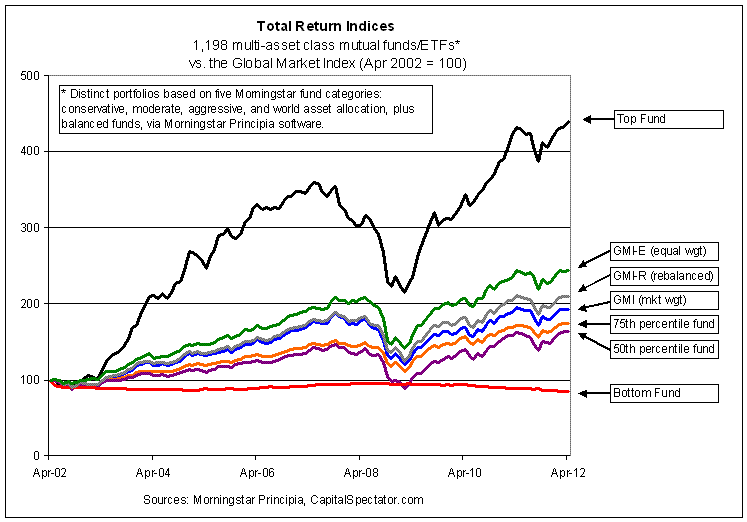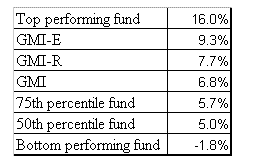Fed cuts rates for third time, but Powell signals higher bar for further cuts
Brett Arends of SmartMoney skewers the simple stock/bond balanced fund strategy, and rightly so. There's no reason to rely on a basic equity/fixed income mix in a world where a wider array of asset classes are available through low-cost ETFs.
Recognizing that the average investor has a rich menu of betas at his disposal brings us to the critical issues for portfolio management: a) choosing asset classes; and b) managing the mix through time. There's plenty to say on these topics (see my book Dynamic Asset Allocation, for instance), although it's useful to start by considering a good benchmark, which is the inspiration on these pages for the Global Market Index. This index is a passive allocation to all the major asset classes and it comes in three primary flavors:
1) unmanaged, market-value-weighted (GMI)
2) a year-end rebalanced version of the market-valued weighted index (GMI-R)
3) an equally weighted allocation to the major asset classes that's rebalanced back to equal weights at the end of every year (GMI-E)
One reason why passively owning everything is a strong benchmark is that it makes no assumptions about what's hot or what's not. As such, it's a fully transparent strategy that requires no skills or talent. The straight GMI, in fact, requires no decisions at all once it's initially launched. Market-value weighting takes care of itself. But if you're skeptical of the underlying theory for such a system—a.k.a. the capital asset pricing model—you might consider a model-free allocation to the major asset classes: GMI-E. In order to keep the weights equal, periodic rebalancing is necessary; in this case, I arbitrarily chose the end of each calendar year. As for the rebalanced version of the market-value weighted index (GMI-R), it's something of a hybrid of the other two.
How have these indices performed? Rather well, at least in comparison with a broad sampling of actively managed asset allocation mutual funds. In my previous update in January, GMI was a strong competitor. In fact, GMI has continued to outperform nearly 90% of roughly 1,200 funds for the 10 years through April 30, 2012 (based on funds with at least 10 years of history through the end of last month via Morningstar Principia software). The rebalanced version of GMI fared even better, and the equal-weighted strategy did better still, as you can see in the chart below.
Here's the 10-year annualized total return figures for the chart above:
Does GMI's strong relative performance mean that everyone should abandon their asset allocation strategy and go passive? No, probably not, although you should think twice before straying too far from the GMI allocations. In any case, there are other factors to consider for building portfolios, such as your investment horizon and how your finances and career differ from the average investor's profile.
Meantime, the simple GMI strategies tell us once again that mindless diversification across asset classes and basic rebalancing captures quite a lot of what's otherwise billed as enlightened investing techniques. You can pay a lot more for investment advice, or spend a lot more time analyzing expected return and risk. Assuming you'll do a lot better, however, is probably asking too much for most of us.
